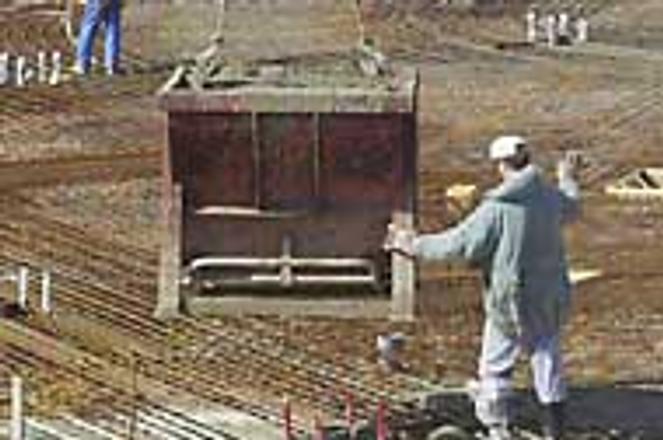THE STATE'S investment role has fallen in the building sector.photo: TASR
DESPITE strong general economy growth pegged at four per cent this year, the construction sector in Slovakia has still not picked up from its dramatic production drop in 1999, and builders say they need financial support to bring the sector back to prominence in the national economy.
Annual production in the Slovak construction industry fell below 4 per cent of gross domestic product (GDP) last year, far below data in European Union countries, where construction accounts for 8 to 12 per cent of GDP. The number of employees in the sector has steadily fallen from 250,000 in 1990 to 122,000 this year.
The reason, say sector players, is cuts in state investment and a general decline in local purchasing power under the reformist 1998-2002 Mikuláš Dzurinda government.
"EU countries, in spite of the fact that they are saturated with buildings and infrastructure, are still investing into construction. While our industry is far from such saturation, we are falling behind the EU more and more," said Anton Novotný, director of the construction section at the Ministry of Construction and Regional Development.
"In this way we are creating a kind of 'civilisation barrier' between us and European Union," he added.
The Union of Construction Entrepreneurs of Slovakia (ZSPS) has said the construction industry is in "deep crisis", blaming the stagnation on a lack of investments after heavy state spending under the former Vladimír Mečiar government, which used infrastructure building as an image-enhancing tool.
"After a dire 25 per cent year-on-year fall in 1999, construction production has been around Sk70 billion annually, which is around 70 per cent of its total capacity," said František Slávik, ZSPS president, adding that this year's figures would come in about the same as last year's.
"The majority of citizens are insolvent - cities and towns also lack finances and therefore invest very little. Chronic problems on the Slovak political scene have also repelled potential foreign investors," said Slávik.
"Building is restricted despite increasing room for loans. The average citizen, even if he can get a loan, has a hard time paying it back," he added.
Novotný explained that not even government support, were it to come now, could increase popular demand for construction sector services.
"The Construction Ministry has taken a step to support construction with the renovation of the state building fund, but neither towns nor citizens have used all the money available. We could have pressed the government to provide more money, in line with its earlier promises, but given that the available finances had not been used, it was not possible," said Novotný.
"Slovakia is mostly lagging behind in the construction of flats, but given that the state is not financing this any more, we have to find ways to attract people and increase their demand for loans," he added.
The government, however, is already under heavy pressure from international economic groups to reduce spending, particularly on subsidies to home buyers and mortgage takers, and is thus not expected to greatly increase its support for building projects.
"It's not only the International Monetary Fund telling us to maintain a balanced budget, but also the European Union. In such a situation, providing more money for infrastructure development projects is a problem. We don't see any room to increase state support in the near future," said Novotný.
"In 2002 we expect construction sector investments to reach Sk75 billion. Of this figure, the government will provide - both directly and indirectly - almost Sk56 billion, which is too high.
"I don't expect the situation to improve during the next four years. The state simply doesn't have the possibility to increase its support through public finances," he continued.
Nevertheless, increasing money to the construction sector is seen by builders as key to boosting the economy as a whole.
"Construction could very favourably influence the national economy, but it is being hurt by low demand in both the public and private sectors," said Novotný.
"If the construction sector reached its full capacity, 60,000 more people would be employed. Moreover, for every construction sector employee, two more job positions would be created in other sectors, thus making it 180,000 people."
The indicators are not all bad, however, and despite stagnation compared to the first quarter of last year, production picked up in April by 9 per cent year-on-year to Sk6.4 billion, stimulated mainly by increased highway construction.
Ľudová banka analyst Mário Blaščák called the April growth favourable and said that more could be expected with the approach of September national elections.
"Opening highways is quite a popular form for governments to present their successes in Slovakia," he said. Increasing highway construction is also a condition of a European Investment Bank loan to Slovakia, which was arranged to help enlarge the Slovak highway network and connect it to pan-European corridors.
European Union pre-entry funds should also help the sector, and Eric van der Linden, head of the European Commission delegation to Slovakia, said the country was well prepared to use 157 million euros allocated for infrastructure development until 2006.
Linden added that "Slovakia as a candidate for EU entry will, with full membership, be able to get more financing from structural funds."
Access to these funds should definitely help the sector, said Novotný, adding that "once we are in the EU we will be able to build great things. [EU] structural funds require the government to pay only 25 per cent of an entire project, so we will be able to build things that we can not afford now."


